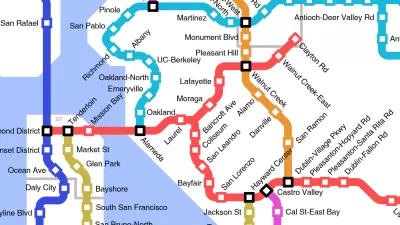Finally, we know where Internet trolls come from—no, not the basements of parents' houses.

Lo Bénichou shares the results of a partnership between Wired and Disqus, the online comment platform that you will find below this article and all the others on the Planetizen website.
The two media companies set out to quantify the problem of bad behavior in the comments section—an issue since "day one" of the Internet, according to the article. To do so, Disqus "analyzed 92 million comments over a 16-month period, written by almost 2 million authors on more than 7,000 forums that use the software," explains Bénichou.
Wired then took the findings and packaged them in some slick interactive maps and infographics. In the map of the nation, for instance, we see that in the state of California, where Planetizen is headquartered, 7.5 percent of the comments studied were "toxic." The city of Los Angeles, where Planetizen is located, slightly outpaces the state, with 8.1 percent of its comments being toxic—mostly on Curbed, we assume (just kidding). In nearby Bellflower (hometown of famous former Major League Baseball players Nomar Garciaparra, Jeff Kent, and Trevor Hoffman), a whopping 32.7 percent of comments are toxic. That makes Bellflower the trolliest city in the country, according to this analysis.
The article includes insight into the methodology of the Disqus study, and additional findings on the trolliest time of the day (aka, "Prime Troll Time") and the percentage of Internet commenters who have dabbled in troll behavior at least once.
FULL STORY: Trolls Across America

Planetizen Federal Action Tracker
A weekly monitor of how Trump’s orders and actions are impacting planners and planning in America.

Maui's Vacation Rental Debate Turns Ugly
Verbal attacks, misinformation campaigns and fistfights plague a high-stakes debate to convert thousands of vacation rentals into long-term housing.

San Francisco Suspends Traffic Calming Amidst Record Deaths
Citing “a challenging fiscal landscape,” the city will cease the program on the heels of 42 traffic deaths, including 24 pedestrians.

Defunct Pittsburgh Power Plant to Become Residential Tower
A decommissioned steam heat plant will be redeveloped into almost 100 affordable housing units.

Trump Prompts Restructuring of Transportation Research Board in “Unprecedented Overreach”
The TRB has eliminated more than half of its committees including those focused on climate, equity, and cities.

Amtrak Rolls Out New Orleans to Alabama “Mardi Gras” Train
The new service will operate morning and evening departures between Mobile and New Orleans.
Urban Design for Planners 1: Software Tools
This six-course series explores essential urban design concepts using open source software and equips planners with the tools they need to participate fully in the urban design process.
Planning for Universal Design
Learn the tools for implementing Universal Design in planning regulations.
Heyer Gruel & Associates PA
JM Goldson LLC
Custer County Colorado
City of Camden Redevelopment Agency
City of Astoria
Transportation Research & Education Center (TREC) at Portland State University
Jefferson Parish Government
Camden Redevelopment Agency
City of Claremont




























